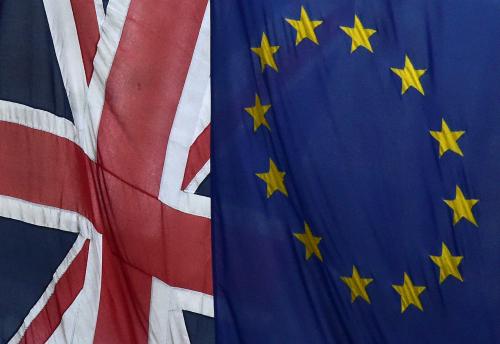After several days of market upset, a few reflections on last week’s momentous vote in Great Britain.
Even more obvious now than before the vote is that the biggest losers, economically speaking, will be the British themselves. The vote ushers in what will be several years of tremendous uncertainty—about the rules that will govern the U.K.’s trade with its continental neighbors, about the fates of foreign workers in Britain and British workers abroad, and about the country’s political direction, including perhaps where its borders will ultimately lie. Such fundamental uncertainty will depress business formation, capital investment, and hiring; indeed, it had begun to do so even before the vote. The U.K. economic slowdown to come will be exacerbated by falling asset values (houses, commercial real estate, stocks) and damaged confidence on the part of households and businesses. Ironically, the sharp decline in the value of the pound may be a bit of a buffer here as, all else equal, it will make British exports more competitive.
In the longer run, the uncertainty will dissipate, but the economic costs to the U.K. still will exceed the benefits. Financial services and other globally oriented industries, which depend on unfettered access to European markets and exchanges, will come under pressure. At the same time, the purported gains from freeing the U.K. from the heavy regulatory hand of Brussels will be limited, because Britain will likely have to accept most of those rules (without ability to influence them) as part of restructured trade agreements. Immigration is unpopular in the U.K., and slowing it was a motivation for some “leave” voters, but a more slowly growing labor force likely would also reduce overall economic growth.
The rest of Europe will also be adversely affected, even though Frankfurt and a few other cities may gain finance jobs at the expense of London. The biggest risks here are political, as has been widely noted: In particular, markets are already beginning to price in the risk that other countries or regions will press for greater autonomy from Brussels. Even those sympathetic to such demands should worry that attempts to unwind existing trade and regulatory arrangements could be highly disruptive, as they will likely be for Great Britain. A move toward exit by a member of the euro zone would be particularly destabilizing, as even the possibility that a country might leave the common currency could provoke bank runs and speculative attacks on the country’s sovereign debt and on other countries that might be thought to be next in line. The challenge for European leaders will be to keep the overall integration process on track, while finding ways to meet the concerns of potential leavers. One issue that could be revisited is the EU’s commitment to the absolutely free movement of people across borders, which seems more a political than an economic principle; the perception that the U.K. had lost control of its borders was one of the most effective arguments for “leave,” and secessionist movements elsewhere have also seized on the issue. [1]
Globally, the Brexit shock is being transmitted mostly through financial markets, as investors sell off risky assets like stocks and flock to supposed safe havens like the dollar and the sovereign debt of the U.S., Germany, and Japan. Investors are perhaps more risk-averse than they otherwise would be because they know that advanced-economy central bankers have less space than in the past to ease monetary policy. Among the hardest hit countries is Japan, whose battle against deflation could be set back by the strengthening of the yen and the decline in Japanese equity prices. In the United States, the economic recovery is unlikely to be derailed by the market turmoil, so long as conditions in financial markets don’t get significantly worse: The strengthening of the dollar and the declines in U.S. equities are relatively moderate so far. Moreover, the decline in longer-term U.S. interest rates (including mortgage rates) partially offsets the tightening effects of the dollar and stocks on financial conditions. However, clearly the Fed and other U.S. policymakers will remain cautious until the effects of the British vote are better sorted out.
Although bank stock prices are taking hits, especially in the U.K. and Europe, a financial crisis seems quite unlikely at this point. Central banks are monitoring the funding and financial conditions of banks, and so far serious problems have not emerged. (It helps that the date of the referendum has been known for months, giving authorities time to prepare. Also helpful is the substantial buildup in bank capital in recent years.) Through its currency swap lines, established during the global financial crisis, the Fed is making sure that other major central banks have access to dollars. As I’ve already suggested, the biggest risks to financial stability at this point appear to be political—specifically, the risk of further defections or breakdown in the European Union—rather than economic. The story may not be over yet.
[1]Britain has substantial immigration from both EU and non-EU countries. The debate over Brexit sometimes seemed to confound the two, even though only the former is protected by the EU treaties.
Comments are now closed for this post.
The Brookings Institution is committed to quality, independence, and impact.
We are supported by a diverse array of funders. In line with our values and policies, each Brookings publication represents the sole views of its author(s).











Commentary
Economic implications of Brexit
June 28, 2016